Academic Awards mostly for medical applications
This year’s Academic Awards, TU/e’s annual honorary titles for talented students and researchers, go to Henok Abadi, Siddarth Khalate, Rogier Wildeboer and Iris Huijben. The new public award goes to Sophie Cramer. Interestingly enough, all award-winning research projects are medically applicable.
Sophie Cramer, currently a PhD student and Qualified Medical Engineer, receives the public award for her BreatheBuddy. She made a design for a device to treat apnea for prematurity. A gentle touch can stimulate premature babies to start breathing again. Unfortunately, a nurse can’t constantly be present next to the incubator to carry this out, but Cramer’s invention can help because the device automatically stimulates the skin of the infant.
Dealing with noise
Master’s student Mechanical Engineering Henok Abadi receives the Bachelor Thesis Award for his thesis on locally resonant acoustic panels with unique, unusual electromagnetic characteristics. Excessive noise can cause harm to the human ear and can disturb sleep rhythm, among other things. At the same time, noise is unavoidable, for example because of construction projects. How best to deal with this? Abadi wrote a winning thesis about this when he was a Bachelor’s student.
Prostate cancer imaging
Rogier Wildeboer, currently researcher at Philips and a former PhD candidate at Electrical Engineering, receives the PhD Thesis Award for his thesis on a special approach to ultrasound imaging of prostate cancer. Approximately one in six men is diagnosed with prostate cancer in his lifetime. Due to the lack of reliable imaging solutions, prostate-cancer diagnostics is based on twelve needle biopsies that are taken blindly. Wildeboer’s research proves the feasibility of an ultrasound-based strategy for a more accurate diagnosis, as a result of which substantially fewer biopsies will be necessary.
Laser Surgery
Siddarth Khalate, currently Mechatronic Systems Designer at Eindhoven Medical Robotics, receives the PDEng Thesis Award for his earlier work as a designer in training at Automotive Systems Design. He designed an improved laser surgery technique that treats retinopathy in premature babies. This invasive treatment can cause surgeon fatigue. Khalate’s new setup helps alleviate the difficult circumstances during treatment, and makes it possible for surgeons to treat more patients.
Take less samples
PhD student Iris Huijben receives the Master Thesis Award for her thesis at Electrical Engineering. She developed an algorithm for machine learning that can be used during medical ultrasound imaging so that more information can be extracted from fewer CT-scans. One of the advantages is that radiation exposure for patients is diminished this way.
Livestream
In a private circle, the winners received their flowers and cheque during MomenTUm in the Blauwe Zaal. The entire ceremony was streamed live.
![[Translate to English:]](/fileadmin/_processed_/c/a/csm_BvOF_TUe_2020_Academic_Awards_-_MSc_Thesis_Award_-_Iris_Huijben_3b9ad531b3.jpg)

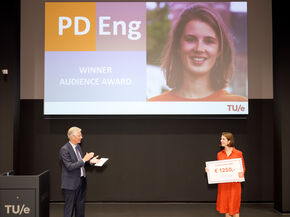
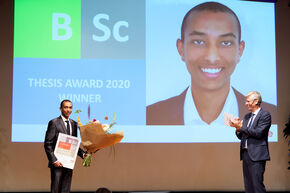
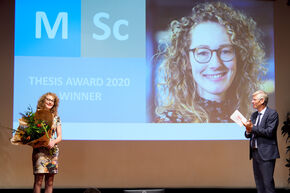
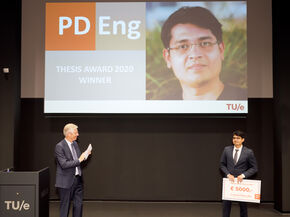
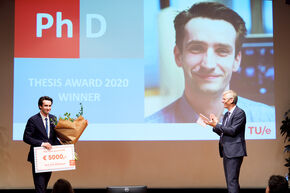
Discussion